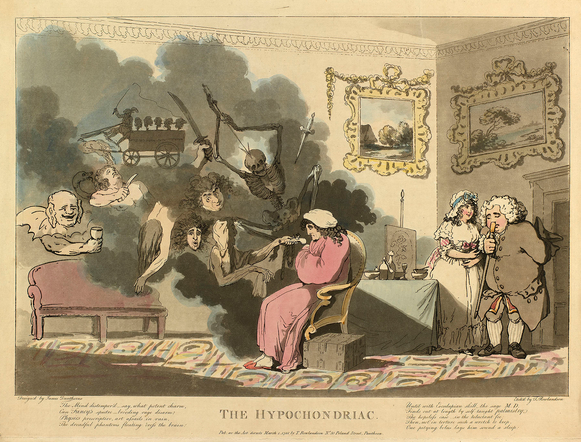Quote
"He is lost to himself, his Friends, his Country, and Relations ; he is dark and benighted in the full Glare of Day, and trembles to behold the Face of the Sun, from an Apprehension, that it insults his Misery."
Links to the Encyclopedia:
Keywords
Chap. 7. Of the Symptoms of Spleen, Vapours, and Hypochondriack Melancholy, when they degenerate into the natural, or religious melancholy Madness.
The Melancholy Madness a most gloomy Scene
I now come into the most gloomy Scene of Nature, that Mankind can possibily encounter, where nothing but Horror reigns ; where the noble Endowments of the reasonable Soul are often disconcerted to a surprizing Degree, and this lordly Creature Man almost debas’d below the brutal Species of the animated Creation.
Definition.
Melancholy Madness is a Complication of continual and unintermitting Horrors, that spares neither Body nor Mind. When this Affection is far advanc’d into the Habit, the Patient appears to all that see him a moving Piece of Ruin, and wears his Soul in his Countenance, which is mark’d with all the Characters of Woe, Gloom, and Desperation. He is lost to himself, his Friends, his Country, and Relations ; he is dark and benighted in the full Glare of Day, and trembles to behold the Face of the Sun, from an Apprehension, that it insults his Misery. He flies to his Couch, in hopes to bury his Cares, and lull his soul into sweet Slumbers : His Couch ! miserable as he is, denies to him that sweet Ease and pleasing Consolation, and perplexes his Mind with Phantoms of Furies just ready to devour him.
Sources
Taken from Nicholas Robinson, A New System of the Spleen, Vapours, and Hypochondriack Melancholy: Wherein All the Decays of the Nerves, and Lownesses of the Spirits, are Mechanically Accounted for. By Nicholas Robinson, M.D. and of the College of Physicians, London. Printed [by Samuel Aris] for A. Bettesworth, W. Innys, and C. Rivington (London), 1729, p. p. 234-235. Transcription by Noémie Vandenborre (UBO). Full book in ECCO.
